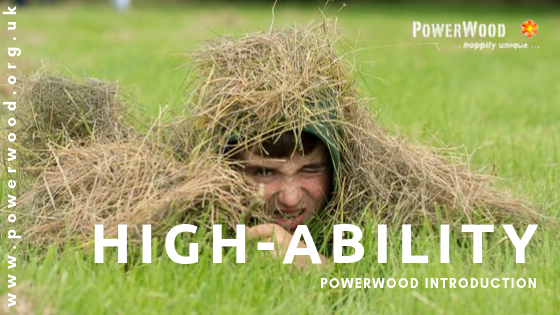 Children and teenagers who have traits of intensity, (hyper)sensitivity and ‘super simulatability’, (known as ‘overexcitability (OE)’ in the psychological world) are often (more)able children and teenagers. According to the latest research, OE occurs mostly with an IQ over 110, however, although previously thought, children with a high IQ do not always have OE.
Children and teenagers who have traits of intensity, (hyper)sensitivity and ‘super simulatability’, (known as ‘overexcitability (OE)’ in the psychological world) are often (more)able children and teenagers. According to the latest research, OE occurs mostly with an IQ over 110, however, although previously thought, children with a high IQ do not always have OE.
Children who have a high IQ, measurable or not, on the ‘Gifted&Talented’ register at school yes or not, when having OE that the intensity increases with the increasing IQ. Therefore if you suspect your child has OE and/or (more)able it is advisable to read on.
This website uses the term (more)able or high-able and not the word ‘gifted’ because it can carry negative connotations for some (see below*). Although if parents and teachers wish to find relevant information on this topic on the Internet, for example, the word ‘gifted’ is most frequently used in the academic world and therefore will most likely yield search results.
What about the word ‘gifted’?
*The word ‘gifted’ could imply that some children HAVE more ‘gifts’ than others whereas it is important to stress that all children possess their own set of unique gifts. What is being called into question by using the term ‘gifted’ is not the number of gifts a particular child possesses but the nature of these gifts and how it affects their ability to interact with the world around them.
Secondly, the UK government has defined the term ‘gifted’ as children and teenagers who consistently achieve high academic results, to include them on a school’s ‘Gifted & Talented’ register. However, there are many children who, for whatever reason, although they possess an equal intelligence to those placed on this register, do not achieve in the same way. These individuals need our help and our guidance.
To further complicate matters, although the government has withdrawn much of its funding for pupils on the ‘Gifted & Talented’ register, schools are still expected to implement the ‘Gifted and Talented’ policy; an alarming thought considering the great strain schools are already under.
It is also hard to find funding for the additional emotional needs of the officially recognised ‘Gifted & Talented’ pupils in state schools. Such schools mostly can’t afford to do more than provide academic enrichment through extracurricular activities for designated pupils.
Elitist?
Finally, quite frequently high-ability is regarded as elitist. The policy for ‘Gifted & Talented’ by the Department for Children, Schools and Families has been mostly directed at the academic achievement of the top 10% of pupils. Now even the top 15%, is sometimes perceived as elitist: giving privileged children even more advantages.
The governmentally approved selection methods and developed programmes for the Gifted & Talented were seen to be elitist by parents who thought they mostly served the already high-achieving pupils from higher socio-economic backgrounds while letting down the children who are undetected, underachieving, or having unrecognised learning disabilities, called Twice/Dual or Multiple Exceptionality or having a high level of ‘overexcitability (OE)’. These children have low achievement because their emotional or social needs are not met, and they don’t manage to perform because of their socio-economic background e.g. no quiet place to do their homework resulting in no entry to extra-curricular programmes.
High-able?
High-Ability is not just a preserve of the privileged classes. (More)able children are born in families from all walks of life, irrespective of class, socio-economic or educational background of the parents, and whether they are achieving or not. In every (state) school there are high and low achievers that would fall into this group.
Successful Intelligent
To become Successful Intelligent: finding a balance between intellectual, creative and practical abilities, there is more needed than high-ability alone. An understanding of the issues related to high-ability, such as asynchronous development, greater OE, more extreme learning styles etc., will give parents, teachers and teenagers themselves insight in how high-ability may affect development and personality and how to use it for the better.
Behaviour
Sometimes high-able children can have puzzling, withdrawn or challenging behaviour, irrespective of whether they are achieving or not. They can be very intense and extremely sensitive and can have ‘overexcitability (OE)’. They can express intense loneliness, even to the point at which they talk about wanting to die. This can happen at a very early age. Those children or teenagers can have unexplained medical conditions related to anxiety e.g. stomach and headaches. Some can be very strong-willed, questioning authority and can lose their trust in people and their intrinsic motivation if not supported constructively.
Environment crucial
Last but not least a supportive and stimulating caring environment is crucial for healthy development, therefore, we initiated PowerWood to support families to get the necessary information and strategies to be able to enjoy being together within a supportive friendly network of families who face the same challenges as you do.
Emotion Regulation
Multilevel Emotion Regulation Theory (MERT) is a holistic theory developed by Simone de Hoogh. The theory explains how neurodiverse (young) individuals and parents of neurodiverse children can develop emotional regulation skills and direct their energy towards self-chosen goals, and contribute to society.
Book a FREE Introductory Talk with a Professional*
You can read more about PowerWood’s Consultancy Sessions, the Benefits of a Free Introductory Talk and PowerWood’s Consultancy Services Tiered Fee Structure.
Boundary Test
A HUGE thank YOU to the son and daughter of Ernest Hartmann’s who gave PowerWood permission to use and put the full academically approved questionnaire about the Boundary in the Mind on PowerWood’s website.
Find out how the Boundary in the Mind affects you or your child
